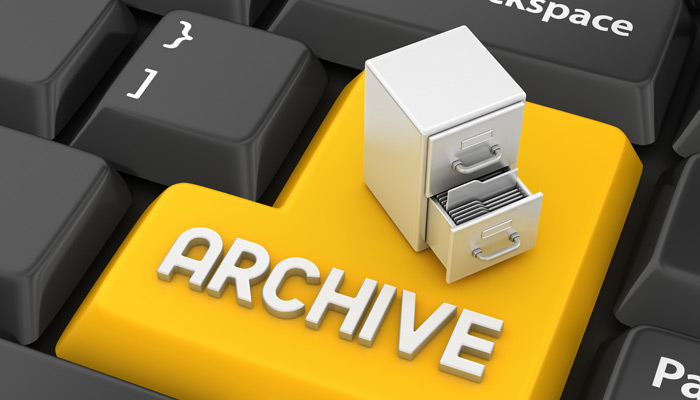Digital archiving aims to ensure permanent access to documents and documents through a range of digital processes. To do this, it is essential that digital objects are securely understood and digital files are managed. The digital file of documents offers remarkable advantages compared to the actual file on paper. To secure digital archiving, a keyboard ensures the integrity of this archive. What are these keys? To find out the answer read.

What is digital archiving?
Digital archiving refers to the process of saving or storing data or information on certain media in digital form such as documents, videos, photos, etc. Digital archiving begins as soon as the document is created, bringing together the procedures, tools and means implemented for collecting, identifying, sorting, classifying and maintaining digital content in the medium and long term on a suitable and secure broker The digital archive can be a complex set with a graded storage system or on a hard drive.
Importance of digital archiving
Digital archiving enables the fulfilment of legal obligations to preserve management documents, and to provide legally accepted electronic documents in order to protect and defend their rights in case of administrative or legal litigation. Not only this, but digital archiving is important for companies because it allows the storage and organization of important documents and data, This can include financial records, employee information and customer data And then all this information is kept in digital format, which is easy for companies to access and use as needed.
Digital archiving can also provide access to documents at any time and from anywhere, and this is an important feature for organizations that need to share records with employees or customers located in different geographical areas.
4 keys to secure digital archiving
When securely archiving documents and emails in the cloud, there are specific security standards to watch out for, here are four best practices for digital archiving.
1. Document encryption and access rights
The first key to digital archiving includes authentication, data traffic, access control and document encryption.
Validation:
Only high-level managers and executives should be allowed access to certain documents by providing a unique username or password, this authentication gives users specific rights while providing an audit path to those who have accessed a document, the time of their arrival, and the action they have taken.
Data Traffic:
The HTTPS protocol must encrypt the flow of information between web components, this protocol provides an additional security layer (TLS/SSL) via the HTTP protocol.
It also prevents hackers from intercepting sensitive company information and documents such as passwords, user information and financial statements.
Control validity Entry validity:
Access to the document in digital archiving requires multiple levels of control to protect information, access must be possible for functional roles, complete groups, as well as for individuals, and smart rules for controlling (restricting) such access and what employees can do with these documents must also be set.
For example, an HR manager may be able to access all employee documents such as CVs and performance evaluations while being able to share these documents only with people who have access to them, for example, a report manager. In turn, employees can only access their performance audits and other financial and insurance information at the individual level.
Encryption:
All documents should be encrypted during digital archiving using 256-bit SSL encryption (AES), this encryption is one of the most secure and current standards used by the US government for confidential documents.
2. Data Storage
Storing data in digital archives essentially means that files and documents are digitally recorded storage system for future use, storage systems may rely on electromagnetic, optical or other media to preserve and restore data if necessary Also, data storage makes it easy to back up files to save them, It was quickly recovered in the event of an unexpected disruption of computing or cyberattack.
Data storage can happen on actual hard drives, drives, USB drives or virtually in the cloud, and the important thing is that your files are backup and readily made available in case your systems break down irreparably.
Also through digital archiving one of the most important factors to consider in terms of data storage is reliability, how strong security features are, and the cost of implementing and maintaining infrastructure, browsing through different data storage solutions and applications can help you access the option best suited to your business needs.
Any secure document archiving or document management software needs built-in mechanisms to protect the local user environment and software.
3. Data sovereignty and segregation
Secure digital document archiving requires data to remain within limits, where client information is legally protected and is separate from cloud provider system files.
With regard to data sovereignty, many companies prefer to keep data within their sovereign borders, unless they do business in those other countries, for example, companies in the European Union typically do not want to obtain their data in South America. Similarly, many U.S. companies prefer to keep their data in the United States.
Thus document archiving systems need to keep data and backups within those boundaries where the client's information is legally protected.
As far as data segregation means that client data is kept separate from the cloud provider's system files that provide a digital document archiving solution, the customer's data cannot be seen at all, ensuring that all customer information remains private.
4. Document integrity and auditing
Information integrity is a critical issue in the management and digital archiving of documents, where organizations must ensure that their documents, information or data:
- Accurate and fault-free or defective
- Compatible with standard, rule or policy
- Unmodified and never changed in shape, meaning or personality
- Consistent and unified throughout her life cycle
- Used only by persons authorized to use authorized processes
This is especially important for emails, since emails are an inherently unsafe means, providing secure digital archiving of emails prevents them from tampering, editing and missing, and keeping email connections is an important element to understand the connection and context of some business operations.
Conclusion:
Digital archiving is particularly important for large archiving companies with a large number of documents passing through different departments, as this not only simplifies the work, but also saves staff time, digital document archiving is an integral part of a modern company's IT infrastructure.
Important Topics
Reference
1. << Electronic document & records management system to manage records like money>>, openaccessgovernment
2. << The importance of document storage in today’s digital age>>, citizen

Comments
09 Aug 2023 12:53 AM
محمود
موفقين
09 Aug 2023 12:55 AM
ابراهيم
طرح موفق
Add New Comment